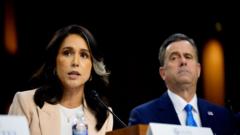A significant security breach involving U.S. national security officials was downplayed by President Trump and his intelligence chiefs, who faced severe criticism during congressional hearings following the leak of sensitive chat messages.
Trump Defends Team After Shock Signal Group Chat Leak

Trump Defends Team After Shock Signal Group Chat Leak
Senators hold intelligence chiefs accountable as probes begin over national security messaging scandal
The White House is reeling from a breach where a journalist was mistakenly added to a Signal group chat, exposing discussions related to airstrikes in Yemen. President Donald Trump, alongside leaders from the intelligence community, described the incident as a minor glitch, asserting that no classified information was shared. Intelligence Director Tulsi Gabbard and CIA head John Ratcliffe faced questioning during a Senate Intelligence Committee hearing, which pivoted from its original agenda focusing on drug trafficking to the fallout from the leak.
The situation escalated after A journalist from Atlantic magazine, Jeffrey Goldberg, was accidentally invited to a chat that included national security officials discussing military strategies. Following a recent airstrike that resulted in significant casualties, questions arose about the appropriateness of utilizing unsecured platforms for sensitive discussions. Despite the gravity of the situation, both Gabbard and Ratcliffe denied any wrongdoing, insisting that no operational details were shared.
Democratic senators harshly criticized their handling of national security, with some labeling the breach as "embarrassing" and indicative of a larger issue of incompetence within the ranks. In stark contrast, Republicans maintained a more lenient stance, with some suggesting that the breach could have been much worse.
Trump defended his national security adviser Mike Waltz, who was at the center of the controversy, labeling the incident as an operational oversight without serious ramifications. Legal actions have already begun, with watchdog groups filing lawsuits against officials for potential violations of federal record-keeping acts spurred by the chat's self-destructing messages.
This incident has sparked discussions regarding the vulnerability associated with using consumer-grade apps for critical communications, prompting calls for deeper investigations and enhancements in operational security among military and intelligence circles.
Responses from security professionals highlight a broader implication on the importance of safeguarding national security conversations, as subsequent evaluations question the reliability of using digital messaging platforms in sensitive government contexts.
The situation escalated after A journalist from Atlantic magazine, Jeffrey Goldberg, was accidentally invited to a chat that included national security officials discussing military strategies. Following a recent airstrike that resulted in significant casualties, questions arose about the appropriateness of utilizing unsecured platforms for sensitive discussions. Despite the gravity of the situation, both Gabbard and Ratcliffe denied any wrongdoing, insisting that no operational details were shared.
Democratic senators harshly criticized their handling of national security, with some labeling the breach as "embarrassing" and indicative of a larger issue of incompetence within the ranks. In stark contrast, Republicans maintained a more lenient stance, with some suggesting that the breach could have been much worse.
Trump defended his national security adviser Mike Waltz, who was at the center of the controversy, labeling the incident as an operational oversight without serious ramifications. Legal actions have already begun, with watchdog groups filing lawsuits against officials for potential violations of federal record-keeping acts spurred by the chat's self-destructing messages.
This incident has sparked discussions regarding the vulnerability associated with using consumer-grade apps for critical communications, prompting calls for deeper investigations and enhancements in operational security among military and intelligence circles.
Responses from security professionals highlight a broader implication on the importance of safeguarding national security conversations, as subsequent evaluations question the reliability of using digital messaging platforms in sensitive government contexts.





















